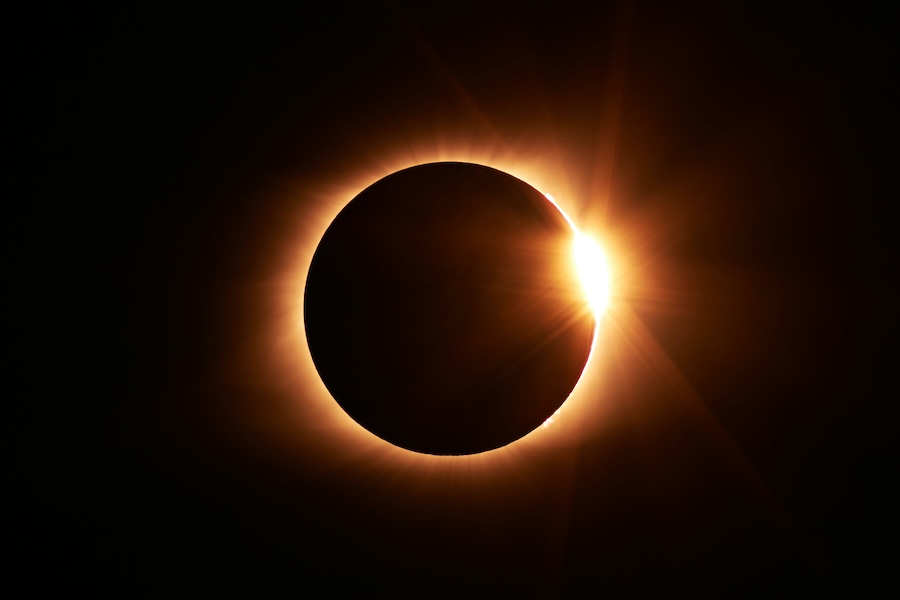On April 8th, a total solar eclipse will be visible across North America, its path ranging from Mexico to Canada. Since the beginning of human history, these sorts of astronomical events have been thought to herald strange occurrences here on earth. How could they not? Seeing the sun plunge into darkness must have felt like a heady omen to people who didn’t fully understand what they were looking at.
The Bible is full of references to prophetic astronomical events: the star that heralds Jesus’ birth, the blood-coloured moon in Revelations. So, it’s no surprise that for centuries, Christians in particular held superstitious beliefs about celestial movement. In the unfortunate case of Pope Urban VIII, a solar eclipse was even said to signal his imminent death. It was a prediction that would end up shaping how even present-day Catholics think about the universe.
Urban VIII is probably most famous for putting Galileo on trial over his book about heliocentrism (the idea that the earth and other planets orbit the sun), but the pontiff’s real enemy lay in those who studied the skies above. When he first came into power in 1623, astrology, which wasn’t yet differentiated from astronomy, was officially sanctioned by the church. It was also considered a legitimate academic pursuit, requiring a serious understanding of mathematics to plot where the sun, moon, and various planets were at any given moment. Astrologers had long been able to use these calculations to tell when eclipses would happen, even if they didn’t fully understand what they were. They also used them to cast horoscopes to predict the future — including the pope’s forthcoming demise during an eclipse on Christmas Day in 1628.
More on Broadview:
- Why some experts see the Virgin Mary as a prophet too
- Faith communities can offer a way out of collective apathy
- How ancient concepts of leisure offer a new way forward for churches
After hearing the news, Urban VIII had his personal astrologers run the numbers. The result was the same: a certain alignment of planets along with the eclipse meant that he was approaching his last days on earth.
Desperate to ward off death, Urban VIII contracted the services of Tommaso Campanella, a friar with a questionable past. Campanella was many things: an astrologer, a heretic, a philosopher. He was also fresh out of prison, having spent 27 years there for conspiring against the Spanish rulers of his home province of Calabria. But most importantly, at least as far as the pope was concerned, Campanella had written a book in which he claimed to know a type of magic that could ward off the fate of an unfavourable astrological event.
The two got to work, performing several rituals together that Campanella later described in a book, much to the pope’s dismay. Inside of a room at the papal residence, the friar hung white silk sheets on the walls and burned a special incense made of laurel, myrtle and rosemary. He set up lamps and torches to symbolize the sun, moon, and five planets, then drew the signs of the zodiac and had Urban VIII drink a special liquor. Against all prophesied odds, he survived the eclipse.
Two years later, astrologers once again began predicting that an eclipse heralded the pope’s end. After escaping death for a second time with more help from the friar, Urban VIII decided to take his fate out of the hands of others. On April 1, 1631, he issued the landmark papal bull Inscrutabilis judiciorum Dei (“The Inscrutable judgments of God”) that forbade all Catholics everywhere from performing any astrological predictions.
It might seem like a dramatic reversal, but Urban VIII’s papacy came at a strange time as far as science was concerned: somewhere between the slow collapse of old superstitions and the birth pangs of the modern world. He clumsily did his best to tread the line between the two.
Even the Galileo story isn’t quite as straightforward as it seems: the two men were old friends, and Urban VIII had encouraged the scientist to write his book on heliocentrism — though, framed as a hypothesis. The published version put the pope’s words in the mouth of a foolish character named Simplicio, which could be translated as “simpleton.” Urban VIII felt humiliated, and the subsequent trial probably had as much to do with wounded pride as it did heretical ideas.
Hundreds of years later, Urban VIII’s bull continues to influence the church. In 1998, Pope John Paul II sent out a letter to all the bishops in the church where he mentioned the Inscrutabilis bull by name. In it, he reminded them that “astrological speculations” were incompatible with Catholicism. Strangely enough, John Paul II was born and buried on days when there were solar eclipses. As recently as last year, Pope Francis also spoke out against horoscopes, warning Catholics that they should avoid them — along with magic, tarot cards, and palm readers.
While the Vatican no longer employs astrologers, it does have astronomers on its payroll. Before the last solar eclipse in 2017, Brother Guy Consolomagno, SJ, the director of the Vatican Observatory, told Time that it “reminds us of the immense beauty in the universe that occurs outside of our own petty set of concerns.”
If Urban VIII could hear him, he would no doubt be pleased.
***
Anne Thériault is a journalist in Kingston, Ont.















